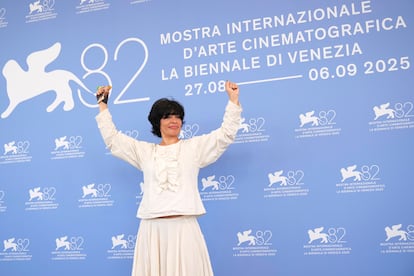The human being does not stop being wrong. Things of earthly life, perfection only belongs to the saints. Either that: it turns out that even the immaculate mother Teresa of Calcutta fell into failures, excesses and contradictions. The nun is no longer here to confirm it – or to deny it – but the Teona filmmaker Strugar Mitevska holds it with some security: he has been investigating his figure for 15 years, speaking with who met her and worked with her. And with all that filmed Mother, which opened the Horizons section of the Venice Festival.
Alberto Barbera, artistic director of the contest, presented it as “an unconventional portrait.” Indeed, the length discovers a woman committed to her mission of helping the poor at all costs: including that of their surroundings. Bandadosa, altruistic, energetic. Also severe, authoritarian, inflexible. And hard anti -abortion. A surprise for many. Although critical voices have already emerged against the economic management of their order, and accusations of being a friend of dictators or not giving professional care to the sick. Perhaps the blinding light of mother Teresa prevented seeing her shadows. Although those that discover Mother They do not intend to cancel her myth: the saint was simply real.
“All doubts raised in the film come from their diary, which covers their dark periods. The truth, or the realization, is never one -dimensional. You have to question to know,” says the filmmaker. The Creator Macedonia began investigating her compatriot – although many create India, Mother Teresa was born in Skopje – for a series that she commissioned the national television of her country. Then, he was able to interview the last four nuns who had collaborated with the saint. From one filming, another arose. “At that time, I discovered the true person. Suddenly, before me a surprisingly modern woman raised: ambitious and bold, an executive director, a rebel, a Robin Hood,” he adds. He continued reading, looking, investigating and even traveling. But the core of the project never changed: “The complexities of its character, the anecdotes of the four sisters and their diary, which reveals their intimate thoughts and deeper dilemmas on fundamental issues such as love, motherhood, faith or ambition.”
Of all this there is a bit in Mother. The film tells a week in the life of Mother Teresa, in August 1948, in Calcutta. That is, just before the legend starts: he has just asked the Pope for permission to leave his monastery and create his own order. While waiting for the yes you need to help millions of marginalized, you spend the day helping everyone who can. His delivery to the mission is the same as his faith: blind. Too important what is at stake to admit concessions: to itself, of course, but neither to your team. The family is only visited once every 10 years: neither the death of a loved one deserves an exception. Any attachment that is not towards God is prohibited. The film suggests that she could feel, and repress, drives in that regard. A nun reorders the room, because relocating it at will is also a vetoed passion. To another forces you to return a new machine to make accounts more quickly. “We have to be precise,” he warns.
“The sequence in which he refuses to use that machine for me contains his essence. Someone focused on what really counts, aware that external distractions could divert his mission. He was the general of a women’s army, of which he expected absolute devotion, nothing less than what he demanded herself. He instituted a system of rotations: each sister changed her position every two or three years, with only one week of preaviso. of others, ”adds the director. One of the nuns in the movie suffers on his own skin. Convene Mother Superior in tears and confess a slip: she has become pregnant. He says it is love, he despairs, begs for help. But the saint doesn’t even flinch. On the contrary, it is isolated. So much that the young, disconsolate, resolves to abort. “We will only know you, I, and the doctor,” he proposes to Mother Teresa. “And God,” replies the relentless Holy. The only moment in the movie in which he really smiles is when the Vatican finally gives him the approval.
“A sister told us that every time Mother Teresa entered a room, she was gathered by the furniture: it was a philosophy of detachment. In the rules of her order, she insisted that the nuns have nothing to possess anything,” says Strugar Mitevska. In another interview, a young Spanish nun told him that joining the cause of the saint had given him “freedom.” Of the expectations that he had to marry someone; of shaving, something I hated; to have to reach commitments with certain impositions of society. “What made me think: ‘How many women 10 years ago, or even more, they found freedom within the Church? It is a controversial idea, but I can understand it.”
Hence, part of the hardness of Mother Teresa may arise in response to the patriarchal society. “I am a woman in a system governed by men,” he says in the film. “Men, men, men,” he laments at another time. Even the saint lost his stirrups in the face of so much inequality. The same that promoted the director herself to extend this project so much: “I have had to turn 50 to have the value of a Xavier Dolan (Canadian filmmaker) of 18. That is irony – and the tragedy – of the women of my generation: the lack of confidence to be, do, dare”. Thanks to Mother Teresa, the filmmaker has embraced the most important faith: in itself.

